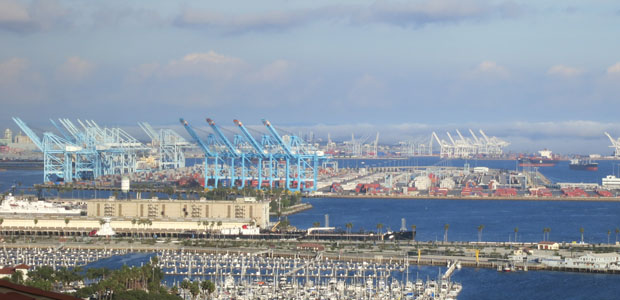
Idle cranes at the ports of Los Angeles (foreground) and Long Beach during last year’s clerical worker strike. Photo by Sarah Bennett.
Though businesses appeared as usual at the Ports of Los Angeles and Long Beach, tension loomed over the weekend as news surfaced last week that the International Longshore and Warehouse Union Local 63’s Office Clerical Unit failed to ratify the tentative contract that ended an eight-day port strike last Fall. Bargaining members of the small OCU voted against the previously accepted contract last Wednesday but have stayed mum on why, not returning requests for comment from the L.A. Times, Press-Telegram and the Post.
The original agreement was announced by the OCU and the Harbor Employers Association on December 4 after the two groups endured days of late-night negotiations with Los Angeles Mayor Antonio Villaraigosa and, in the end, a federal mediator. At the time, ILWU officials said that they were confident that members would vote in favor of what would have been the unit’s first contract since June 30, 2010. Without ratification, all clerical workers remain employed under the terms of their expired contract.
“[The strike] was a community effort that will benefit working families for many years to come,” said John Fageaux, president of ILWU Local 63’s OCU, on the day the strike ended. International Longshore and Warehouse Union International President Robert McEllrath at the time called the tentative agreement “a victory.”
The strike began on November 27 when clerical workers walked off the job at the Port of Los Angeles, a picket line that spread to three of the Port of Long Beach’s six terminals by the next day and was honored by the ILWU’s 10,000 members, backing up goods movement and diverting ships from the crucial twin ports. At issue for the clerical workers was whether the employers can outsource their work functions after positions become open or whether the shipping companies have to hire more clerical workers to replace union members who retire or leave for other jobs.
The proposed contract would have been good through June 2016 and would have been effective upon ratification. According to the Press-Telegram‘s review of the contract, its terms included:
- A 30-day exemption to filling temporary positions under certain leaves of absence conditions
- The ability to reduce 14 full-time positions through attrition
- Language to confirm current practice that all work under the Office Clerical Unit jurisdiction remains with unit clerks
- Job guarantees
- A one-time $4,000 payment covering increases they would have had during the past 30 months
- A $1 hourly increase upon ratification, with another $1 hourly boost in July
- $150-per-month pension contributions per year of service that would increase to $170 by the end of the contract.
A vocal retail association whose members depend on shipments at the ports of Los Angeles and Long Beach expressed disappointment that clerical workers shot down the deal with employers Friday, fearing that it could potentially restart the battle that led to the week-long strike.
“We are extremely disappointed by this vote and strongly urge the parties to work through their differences without any kind of disruption,” said Craig Shearman of the National Retail Federation. “We cannot afford to see another shutdown, as jobs around the country depend on trade at the ports.”
With construction of the new Gerald Desmond Bridge now underway and the Middle Harbor’s budget recently approved, City and Port officials have made competitive upgrades a top priority in the hopes of making Long Beach the premiere destination for the world’s shipping companies. Another work stoppage could mean not only more loss of cargo, but loss of long-term business as competition increases from other West Coast ports with less of a history with worker issues.
“It’s not clear today what will happen next,” Steve Getzug, a spokesman for the Harbor Employers Asssociation told the L.A. Times last week.
Read more:

